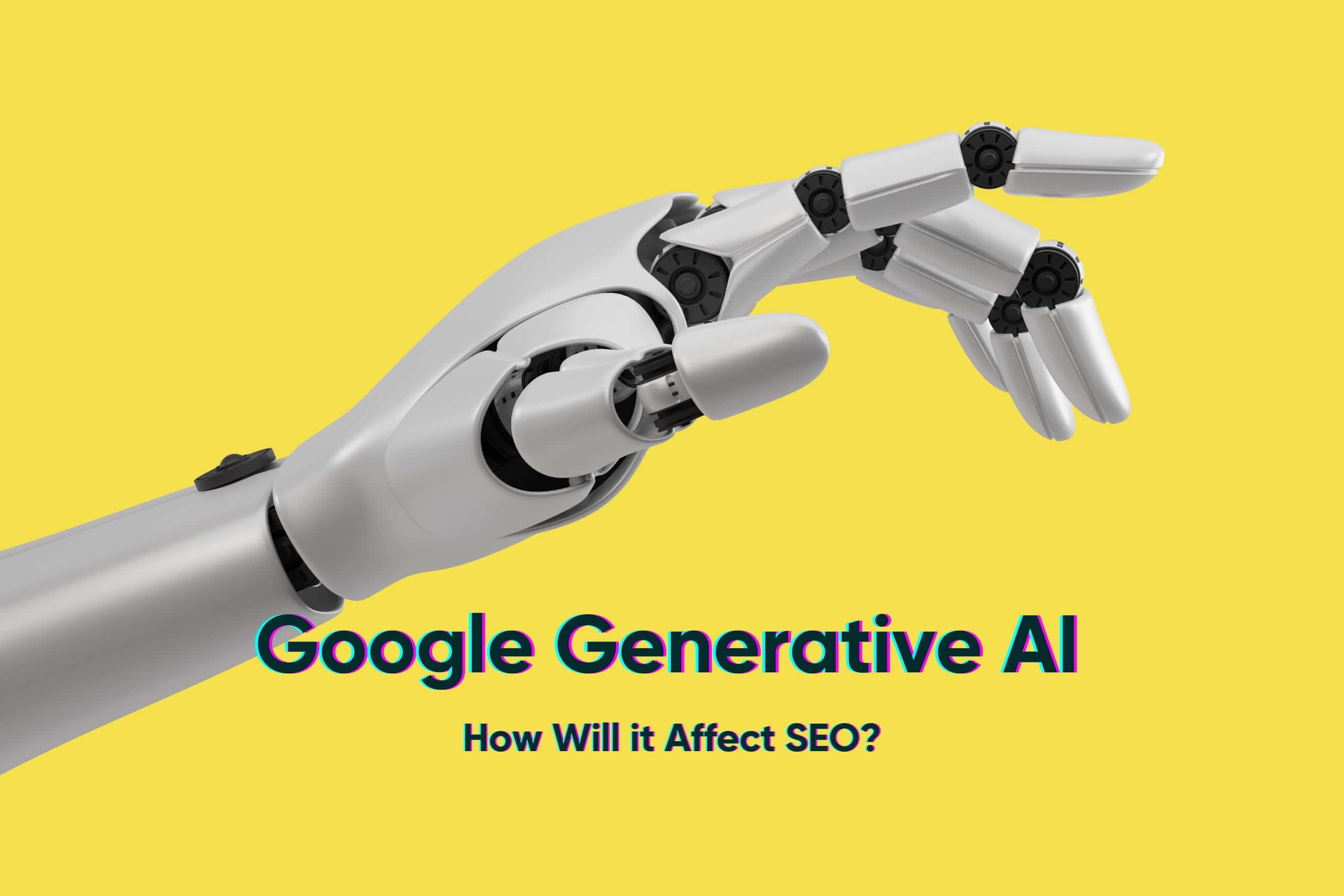
Google Generative AI: How Will it Affect SEO? Welcome, internet-savvy SEO enthusiasts! Get ready to embark on an immersive exploration of a cutting-edge digital realm that's sure to transform your SEO landscape. We're stepping into the frontier of Google's advanced technology called the Search Generative Experience (SGE). Buckle up; we're bridging the gap between the present and the not-so-distant future!
Imagine being able to have search queries not just answered but expanded upon. Visualize a world where you're not just given relevant information but also an enlightened perspective, new ideas, and comprehensive content. That's the realm Google Generative AI in Search promises. It nudges the existing possibilities of search engine use, stretching the boundaries in a way that could revolutionize how we find and assimilate information.
In today’s post, we’ll be venturing into the nuances of this intriguing functionality - tackling everything from what exactly this techno-beast is, how it breaks the mold, and its potential impact on the realm of Search Engine Optimization (SEO). If you've been wondering how to stay ahead of the game in website optimization, stay tuned. Things are about to get very interesting!
Prepare for a dive into the future of search engine use; let’s get started!
What is Google's Search Generative Experience (SGE)?
Google's Search Generative Experience (SGE) is a pioneering technology set to redefine how users interact with search results. It falls under the family of generative pre-training models known for their capability to understand and generate text based on provided information.
Conventional search experiences or algorithms rely heavily on matching keywords and phrases in users' queries to those on online platforms. However, that tends to limit the search results to direct matches, often filtering out numerous potentially relevant pages because they don't contain precise phrases or keywords.
The GSE takes a different approach. Instead of simply matching keywords, it leverages advanced Artificial Intelligence (AI) mechanisms to understand the context of the user's query. It then uses that understanding to generate a broader yet still contextually relevant search response.
In essence, it's akin to moving from a basic 'question and answer' model to a more holistic 'query and exploration' approach. With this innovation, users are likely to find more well-rounded answers and have the ability to explore additional related information that conventional search might not have surfaced.
The goal behind Google's GSE is clear: to enhance the search experience by providing broader, more insightful information rather than just a strict match to the user's original search terms.
Use Cases of Google Search Generative Experience

Google Generative Search presents a plethora of potential use cases across various domains. It aims to offer users more comprehensive results, stretching beyond the limitations of keyword-specific content. Let's delve into how different sectors could benefit from this advanced search model:
- Business: In the competitive corporate world, precision and speedy information gathering are instrumental. Generative Search could be a game-changer in market research, competitor analysis, and industry predictions. It can help companies answer complex queries, uncover deeper insights, and generate ideas on potential products, services, or business strategies.
- Education: For educators and students, Google's GSE can provide a more holistic research experience. It extends beyond finding direct answers to homework or research project questions to offering relevant, related, and contextual knowledge. This could make the learning experience more thought-provoking and intuitive.
- Media and Entertainment: News reporters, entertainment bloggers, and practically anyone in the content creation business could use generative search to delve into intricate concepts, uncover trending topics, and include richer, more diverse information in their articles or blogs.
- Personal Use: From hobbyists to DIY enthusiasts, generative AI in search engines can offer broader, enriching information. Cooking enthusiasts might discover new recipes, fitness aficionados might get lesser-known workout tips, and travelers could unearth hidden travel spots, all in response to their simple searches.
In a nutshell, Google's Generative AI aims to make information search and retrieval a more immersive, enlightening experience across all sectors. It has the potential to bridge gaps in knowledge, stimulate creativity, and provide a more rounded understanding of a topic.
Impacts of Google Generative AI on SEO

As Google’s Generative Search Experience carves a path to a more nuanced, context-aware search approach, it’s crucial to consider its potential impacts on SEO. Here's what those invested in SEO strategies might want to consider:
- Shift from Keyword-centric to Context-centric SEO: With the introduction of generative search, we might see a shift in SEO from a keyword-centric approach to a more context-rich strategy. While keywords will still hold value, the focus will likely be on how they're used within a comprehensive, relevant context rather than merely their frequency or placement.
- Change in Keyword Use and Targeting: Considering generative search's understanding of the context, long-tail keywords and semantic search could gain more significance. It might be more about matching the searcher's intent than exact keyword phrases.
- Significance of Content Quality and Value: If generative search essentially provides an exploration of a query's context, sites offering high-quality, insightful, and comprehensive content will be more appealing. Content depth and value might become even more essential ranking factors.
- Increased Importance of User Engagement: As SGE aims at providing a more enriching experience, metrics that signify user satisfaction, like dwell time, click-through rates, and bounce rate, might gain more influence on SERP rankings.
In summary, the Google Search Generative Experience might lead an evolution in SEO toward a more context-aware, user-centric approach. The SEO techniques that will likely shine will involve a balance of well-chosen keywords integrated into high-quality, insightful content catering to user intent. In other words, E-E-A-T is likely going to remain a staple in Google's ranking algorithm for years to come.
How to Adapt SEO Strategy for Google Generative Search
The evolution of Google’s algorithms, with the new Generative Search Experience, signals a sea-change in SEO techniques. Here’s how you can adapt your SEO strategy to match this next level of AI-powered searching:
- Enhancing Websites Contextuality and Relevance: With Google's SGE focusing more on the context, it's crucial to ensure your content is not just keyword-rich but also contextually aware and relevant. The aim should be to fulfill user intent rather than just answering a query.
- Prioritizing High-quality, Unique Content: As SGE seeks to provide a complete exploration of the search context, content that offers depth, unique insights, and quality information will hold great value. Ensure your content aligns with the context, provides unique insights, and is well-researched and authoritative.
- Leveraging Long-tail Keywords and Semantic Search: To cater to the generative search's contextual focus, incorporating long-tail keywords and focusing on semantic search could be beneficial. These methods align more with the natural language processing adopted by the SGE, ensuring more accurate contextuality.
- Boosting User Engagement Metrics: SGE’s end goal is to offer an enriching user experience. Therefore, focusing on improving user engagement metrics like bounce rate, dwell time, and click-through rate is crucial. Techniques could include interactive content, clear call-to-action prompts, captivating headings, and visually appealing web design.
- Regularly Updating and Adding New Content: To keep up with the changing context and dynamics of search queries, regularly updating and adding fresh, high-quality content on your website can be extremely beneficial.
In essence, transitioning your SEO strategy to integrate with Google’s Generative AI will involve intensifying the focus on context, quality, and user engagement. As SEO landscapes continue to evolve, ongoing adaptation will be critical to maintain relevance and visibility.
In summary
As we pull into the station at the end of our thrilling ride through Google's Search Generative Experience (SGE), it's clear we're not in Kansas anymore. We're in a dynamic, evolving landscape that seems to have taken a page out of a sci-fi novel. But hey, isn't that the beauty of progress?
In the world of SEO, change is the only constant, and it's clear that Google has no intentions of applying the brakes. With the new SGE on the horizon, it's time to get our SEO gears grinding with renewed vigor. Content will need to be not just well-dressed in keywords but also soaking in contextuality and oozing with quality.
Think of it as the transition from black and white TV to color - we’ll need a bit more imagination and a lot more strategic color balancing.
As we bid adieu to conventional keyword-matching processes and embrace a more exploratory and intent-based approach, remember - change may be a five-letter word, but it's not a bad one. It's a challenge. A game. And, well, a little bit of an adrenaline rush.
In the end, Google's SGE might be the fresh breeze that SEO strategies needed, gently pushing us from mere optimizers to becoming storytellers extraordinaires. Let's roll up our sleeves, revamp our strategies, and welcome the era of hyper-contextual search with open arms and ready keyboards!


